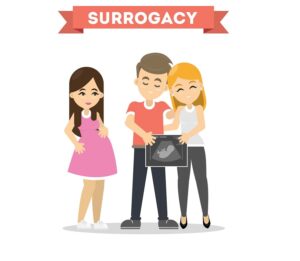
(Image via Getty)
If you are an assisted reproductive technology attorney, New York is not a good state to practice in. For one, in contrast to the vast majority of the rest of the country, compensated gestational surrogacy arrangements are illegal. Like, breaking-the-law, it’s-a-felony, illegal.
Worse, even altruistic (no compensation) gestational surrogacy agreements are unenforceable. Meaning, if you had cancer and lost your uterus, and your cousin agreed to carry your genetic child for you, any agreement you had with your cousin could not be enforced in court. And even assuming your cousin followed through on giving you your baby, you would still not be recognized as a legal parent of your child until undergoing an adoption or other legal process after the birth.
That’s not even where it ends. If you are a single woman, and you turn to a sperm donor to have a child, under New York law, the donor could seek parental rights to your child. And if you’re the donor, don’t get comfortable. The mother could come after you for child support. That’s a precarious situation for everyone, including the child.
The rest of the country has accepted that many people want, or need, to form their families in other ways than the traditional married heterosexual couple blessed with unassisted reproduction. And that those families that are aided by assisted reproductive technology also deserve recognition and protection. But New York lags behind.
So what do New York attorneys do to help protect their clients?
The Attorney Advocate

How Filevine’s New DraftAI Cuts Out Hours Of Writing Work
Now it transforms your document creation with natural language prompts.
I spoke with Amy Demma, a New York licensed attorney with a law practice specific to assisted reproductive technology (ART) law. She explained that when families come to her for counsel in a situation where they need to turn to a surrogate to have a child, frequently her best advice is to refer the families to other attorneys. As in, attorneys not in New York. She advises them to leave the state in order to be able to consider gestational surrogacy in a legally safe and protected way.
But Demma, and other New York attorneys, are not sitting down while families are forced to travel to less hostile jurisdictions. For the last seven years, Demma has joined her New York ART colleagues, most of them members of New York Attorneys for Adoption and Assisted Family Formation (NYAAFF). Together they have worked tirelessly to advocate for legislation — and specifically a bill called the Child-Parent Security Act (CPSA) — to support New York families.
Last spring, it looked hopeful that the CPSA would become law. New York Governor Andrew Cuomo loudly voiced his support. It passed the State Senate. And supporters were certain they had the votes for the CPSA to pass the House. Unfortunately, it was never brought to a vote in the House before the legislative session ended. The clock ran out.
Demma explained that it was frustrating to be so close, and yet not reach the finish line this past year. But based on the hundreds of letters she has received expressing an outpouring of support and gratitude for the work done by New York ART attorneys, she is feeling optimistic for the upcoming session. She is confident if the representatives could see and understand all the New Yorkers who need this, it would sail through. However, she expects another grueling session of advocacy to get that message through to the people that need to hear it.
She described how last session she, along with her colleagues, frequently worked 20-hour days advocating for the CPSA while also balancing their respective law practices. Her home is more than 200 miles from the capital in Albany, but she made the drive, often more than once in a week, to meet and talk with legislators about the importance of the CPSA. Of course, Demma and her colleagues do all of this as volunteers at their own expense.
Despite the stress and the grind, Demma says she is prepared to do it all over again. She is hoping that other attorneys — as well as the individuals and families affected by the current law (or really just wanting better for New York) — will join her in. “Attorneys have a special voice in the legislature. But you do not need to be an attorney. Any New Yorker can make a difference. And it might be your personal story that helps a legislative member see the true impact of the current law and the need for change.”
Demma hopes that her hard work will inspire others to believe they too can be a voice for change and make a difference in the state. “Be heard” is a common directive Demma offers to those hoping to change New York’s surrogacy laws. With the help of others, hard work, and perhaps a little luck, this could be their year.
 Ellen Trachman is the Managing Attorney of Trachman Law Center, LLC, a Denver-based law firm specializing in assisted reproductive technology law, and co-host of the podcast I Want To Put A Baby In You. You can reach her at [email protected].
Ellen Trachman is the Managing Attorney of Trachman Law Center, LLC, a Denver-based law firm specializing in assisted reproductive technology law, and co-host of the podcast I Want To Put A Baby In You. You can reach her at [email protected].
